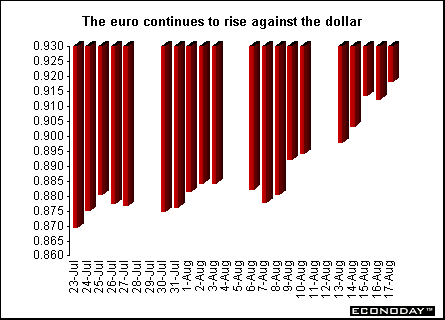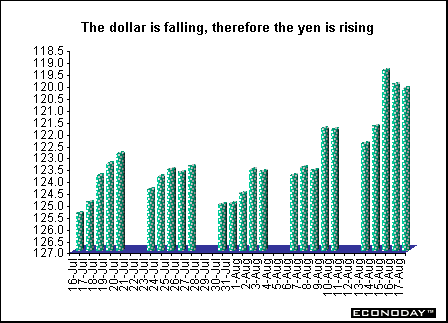
Currencies
The dollar sank to a five month low against the euro and tumbled against the yen as market players continue to focus on U.S. weakness. Some analysts think the dollar's bull market has run out of steam and the trend for the euro is up. Slower growth tends to hurt a currency by deterring investors from buying financial assets. The market is looking for an excuse to sell dollars at the moment. There are doubts whether the U.S. dollar can recover, but others are not so sure. They say that the euro has rebounded in the past only to sink again.
Again, the IMF report was central to the dollar's decline. Its warning that the U.S. current account deficit might not be sustainable raised concern the dollar might be at risk for a sharp depreciation, particularly if productivity performance proves disappointing. Reports in Germany and Japan continued to provide further evidence of a slowdown in other major economies, limiting the dollar's losses. Signs of slower growth in the EMU economies have raised investor expectations for a European Central Bank interest rate cut on August 30. Traders have rewarded the lowering of rates since they encourage stock markets and economic growth.

The rising euro could be bad news for European economies. On the plus side, imports will become less expensive, helping to keep inflation in check. But exports will become more expensive, hurting manufacturers and limiting the possibility of an export driven recovery. Yet lower inflation gives more room to the European Central Bank to cut interest rates more aggressively, spurring economic growth.
Investors are worried over how a stronger yen would affect the earnings of Japan's exporters. Currency fluctuations routinely have an impact on earnings, which by extension have an impact on share prices. But no one was looking for a rise in the yen, especially after the Bank of Japan said they would increase liquidity. Yet Japan's currency is still 11 percent weaker against the dollar than a year ago.

Government officials have expressed concern the yen's strength would hurt Japan's fragile economy by making exports less competitive abroad. The officials said that the yen's rise is inappropriate and the government is closely watching the currency and would take appropriate steps as needed, fueling speculation the Bank of Japan may sell yen in the currency market to weaken it.


Introduction • Global Stock Market Indexes • Recap of Global Markets • Currencies • Indicator Scoreboard

The Bottom Line • Looking Ahead
|